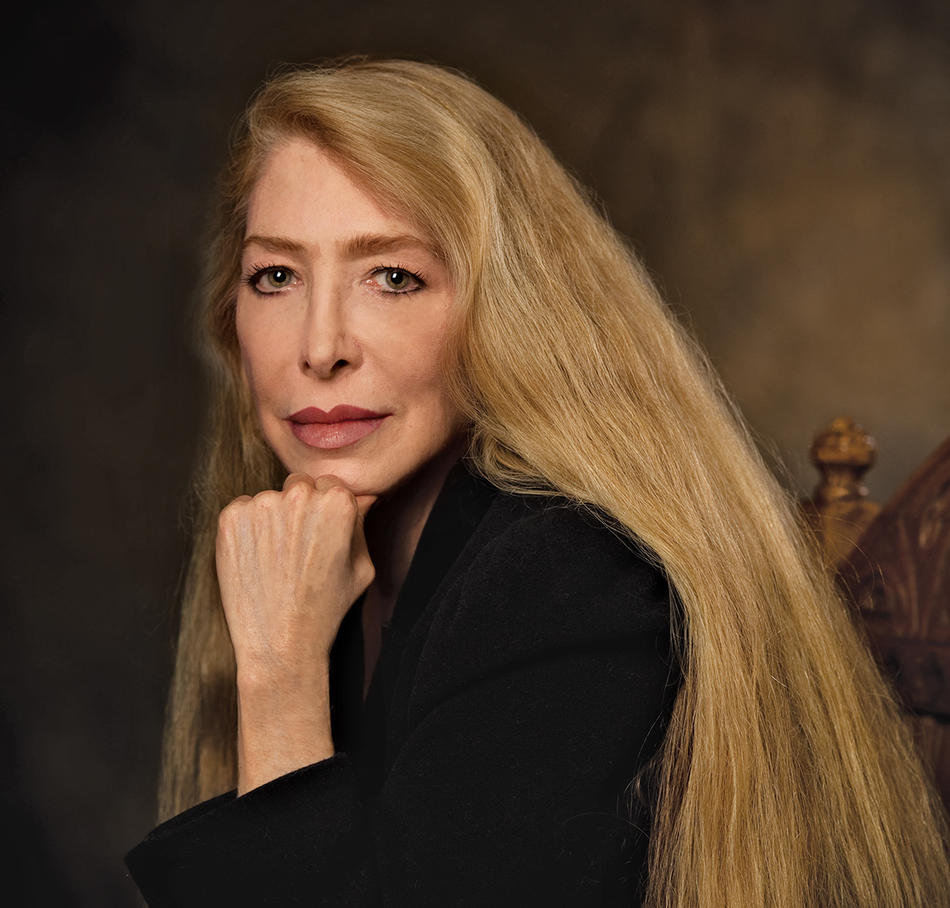Spellbinding. Mesmerizing. Singular. Generous. Empathic. Beguiling. Feral.
These were some of the words poets used to describe Lucie Brock-Broido ’82SOA, head of the poetry division at the School of the Arts, who died on March 6 at age sixty-one. The poets assembled at Miller Theatre in October to honor one of their tribe and, in effect, to grapple with a line from her poem “Infinite Riches in the Smallest Room”: “What if I were gone and the wind still reeks of hyacinth, what then.”
“Losing Lucie has been brutal, upending, cold, and stately,” poetry professor Dorothea Lasky told the gathering of family, friends, faculty, and students. “Death is mean, but losing Lucie this unending season has been meaner.”
In an evening of trembling voices, colorful anecdotes, laughter, and powerful recitations of Brock-Broido’s poetry, an image arose of a flowing-maned, red-lipped, smoky-voiced, caffeinated, night-stalking, feline-loving, People-reading, prank-pulling mother figure, vampire, and sorceress.
“Hearing her voice tonight is fortifying; it’s heartbreaking,” said Tracy K. Smith ’97SOA, US poet laureate and Brock-Broido’s former student. “But there’s something so eternal. How could she know all those things?” Smith’s voice shook. “This small, thin woman contains universes.”
Brock-Broido was born in Pittsburgh in 1956. She embraced poetry at thirteen, she once said, “because I felt I couldn’t live properly in the real world.” She studied with Richard Howard ’51CC at Johns Hopkins and with Stanley Kunitz — “my prophet- teacher,” she called him — at Columbia, and became a teacher herself, first at Harvard, then at the School of the Arts starting in 1993. She published four books of poetry in her lifetime. Her last book, Stay, Illusion, was a finalist for the National Book Award in 2013, which was the year she received Columbia’s Presidential Teaching Award. Lasky remembered her fearlessness as a poet and a teacher: “‘Don’t hold back,’ she told her students. ‘Put it all in there. Give yourself away.’”
Timothy Donnelly ’98SOA, the new head of the poetry division, spoke of Brock-Broido’s “appetite for gorgeousness” and of the hours-long, freewheeling phone conversations he’d have with her, in which, at some point, invariably, Brock-Broido would ask Donnelly to guess what she was eating. “It was always some form of pretzel or experimental cracker,” Donnelly said. Sometimes it was an apple and Donnelly had to guess which kind. “I feel like I’m still on the phone with Lucie Brock-Broido,” he said, “and I’m never hanging up.”
“She would sweep into a classroom or a crowded, noisy restaurant with this heightened existence,” said poet Emily Fragos ’96SOA. “Everything was heightened about her.” Fragos recalled having dinner with Brock-Broido in a restaurant and listening to her read her poem “A Lion in Winter,” about her beloved Maine coon cat, William, her “male muse,” who was dying. “She surrendered completely to the poem. She sank into it the way a musician sinks into a piece of music. You hear feelings; that’s all that’s left.”
Fragos, her voice quavering, addressed her friend. “Lucie, I will love you, I will miss you, for the rest of my life. And you saved my life. I’m so glad I said that to you before you left us.” Fragos then prepared to read “A Lion in Winter,” from Brock-Broido’s 2004 book Trouble in Mind. “I don’t know if I can get through this — I really don’t,” Fragos said, but she did.
A Lion in Winter
As long as the lions are rampant, I will stay
With him.
As long as the clouded leopards
Surround the clouded bed with their gold & cirrus
Air, I will be there too. I was reading
When the winter shooed-
Away the fall and whitely lit the oil lamps of early
Dark. The night was turret-shaped in childhood,
A bunch of mint and mane and swale.
What will I be when he is husk
To himself,
Some flax or ghost of lynx in later winter light.
— Lucie Brock-Broido



